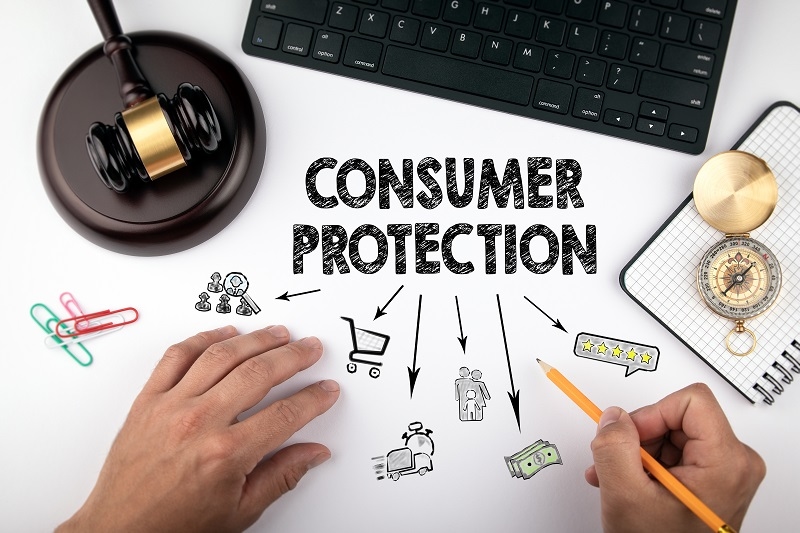
Knowing what you can do as a consumer in today's market is necessary. Each time you purchase a good, use a service, or sign a contract, these transactions involve trust. People have the right to expect that companies will treat them fairly, offer safe products, and be loyal to agreements.
However, in case of any failure, consumer protection laws come to the rescue to maintain equality and fairness. Such laws aim at protecting people from unfair business behavior, guaranteeing easy access to safe products and offering ways to settle disagreements.
This blog will describe what consumer protection is, how it operates, and why it is important to you.
It is the entire range of laws, rules, and regulations whose goal is to secure the buyer against unfair trades, unsafe products, and dishonest practices. Besides being procedural rules, these laws also act as safeguards that provide citizens with confidence in the markets. When you enter a shop, purchase a gadget online, or even sign up for a service, you should always feel safe and secure that the product is working as it was promised, and that your money is not getting wasted.
Each and every consumer who purchases a product or service is entitled to specific rights under the laws protecting consumers. These rights allow people to fight back against unjust actions and ask for justice. The most acknowledged legal rights of consumers are:
You should not be exposed to any risky or dangerous products. In the event it would be food, electronics, or drugs, companies have to make sure about safety first before selling it.
Consumers are entitled to the information on the product/service they are going to purchase, which includes price, quality, and ingredients. The point of this is to eliminate the possibility that advertisements can be false or misleading.
The market under such conditions should be abundant with different products; thus, it would help people make wise choices without being forced into one-sided deals/contracts.
If you have a complaint, you should be put on a list where someone pays attention to you, be it a consumer forum, government body, or court.
When things get terrible, you should be able to claim the money back, get a product repaired, or replace it.
Such legal rights of consumers provide people with confidence, so they make purchases without fearing being cheated or ignored.
There is no doubt that fair trade practices form the most important base for customer protection. These practices ensure that the business operations are conducted in a manner that respects the customer. Examples of fair trade practices include providing clear pricing, selling products that are up to the standard illustrated in promotional materials, and extending the warranty period to customers for their purchased goods and services.
Firms, when they fail to follow standards, may be involved in unfair conduct such as falsely advertising, charging more than what is agreed upon, or including an important aspect of the product/service covered in the advertisement. By just doing this, they not only harm individuals but also destroy the entire trust that is there in the market.
Commercial laws, which are consumer-friendly, demand the implementation of fair trade practices by all companies. Fairness creates a point where companies that are honest flourish, and the customers can feel safe and secure.
Even though laws are strong, there is still room for problems to arise. The products may fail, the services may not be what you expected, or the companies may not keep their promises. Consumer complaints, therefore, form the initial step to get the rights that you deserve in such instances.
Consumer complaint filing is usually quite simple in most regions. Customers can directly report the issue to the company, regulatory bodies, or consumer forums that are established for resolving disputes. The online submission of complaints on modern platforms also makes the process quicker and more accessible.

Customer protection laws grant buyers several legal precautions. These measures serve the purpose of empowering individuals when they are dealing with large corporations. Some of the common legal safeguard areas include:
These legal defenses hand consumers the methods to claim and demand fairness and accountability in the marketplace.
Customer protection is more than just the court cases or government actions; it is also part of daily life. Here are some instances:
In all these instances, the law makes sure that you are not fighting alone against powerful companies but rather you are backed up by a system that supports your claim.
Consumer rights laws may be regarded as a sole good for consumers. However, they also have a positive impact on businesses after some time. The companies that adhere to the principles of fair trade practice get much more than just customers' trust; they also earn a good reputation and have a loyal client base. If the customers are made aware that their rights will be protected, they will have no hesitation in doing business with that company, buying more products, and spreading the word about the company.
Besides, companies that engage in good business do not have to be worried about going to court, getting fined, or suffering from bad publicity. This kind of stability will do the company good in the long term as they can develop in a sustainable and healthy manner.
The executive power is an indispensable factor responsible for customer protection enforcement. The watchdogs keep an eye on the companies, establish requirements for product safety, and make arbitration easier. Agencies also inform citizens about their rights and obligations through educational activities.
There are some countries where consumer courts or commissions are present and this helps in the speedy resolution of cases. The others depend on the organizations of the watchdogs who are vigilant for unsafe or unfair business behavior. Many consumers would struggle for justice against large enterprises if there were little or no government involvement.
Although the law provides very strong protection, consumers must take some of these preventive measures of their own when they go shopping:
The consumer rights laws are not just the characters in a book; these are the guards that have an impact on your everyday life. Trust is an integral part of every transaction you do, be it the purchase of food or online travel booking. These laws give the consumer the needed capacity to request fairness, transparency, and security. They hold the consumers' legal rights, encourage fair trade, and provide means for dispute resolution amongst consumers.
Understanding your legal protections will allow you to shop through them with confidence & hold businesses accountable.
This content was created by AI